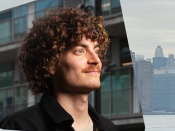Por Dieter Mersch (Zurich University of the Arts).
Over the past fifty years, the sociality of the social has been discussed within social sciences under the notion of what Aristotle called κοινωνία, or more exactly κοινωνία πολιτική (koinōnia politikē). As the koinōnia politikē determined the concept of politics in Antiquity, it should, however be remembered that the polis, as an organized polity, served first and foremost the formation of community, so that the political, the social, and ethics came together. Yet the literal meaning of the Greek word 'koinōnia' is the ‘association,’ the public, so that the expression addresses what is common to the community, what holds it together, as also Plato wrote in Politeia. In particular, it refers to the political organization and its social bonding. The question, the presentation will arise is, what this bonding could mean under conditions of social networks, the internet, and social media, especially by addressing the example of the project of ‘Metaverse’ and the 'avatarization' of meeting together. More specific: Since the constitution of sociality is based in central concepts, such as communication, trust, cohesion, reliability, justice and so on (which literally build the true koinonia), the question will be, how these concepts can be realized and continued under conditions of formal infrastructures that allow only for virtual practices of participation and exchange.
Nota biográfica: Dieter Mersch is a philosopher, Prof. em. of the University of the Arts Zurich. Dieter Mersch studied mathematics and philosophy in Cologne, Bochum and Darmstadt. Between 2004-2013 he was Full Professor of Media Theory and head of the PhD Training Program Visibility and Visualisation: Thinking with Images; between 2013-2021 director of the Institute for Critical Theory at Zurich University of the Arts, Switzerland and Prof. for Aesthetic Theory. Recent publications: Ordo ab Chao / Order from Noise, Zürich / Berlin 2013, Epistemologies of Aesthetics, Zürich / Berlin 2015, Manifesto of Artistic Research. A Defense against its Advocates, Zürich / Berlin 2020 (together with Silvia Henke, Nicolaj van der Meulen, Thomas Strässle and Jörg Wiesel) and essays on Media-Philosophy, Art-Theory, Artistic Research, Image-theory, Musicology and Digital Criticism.


















